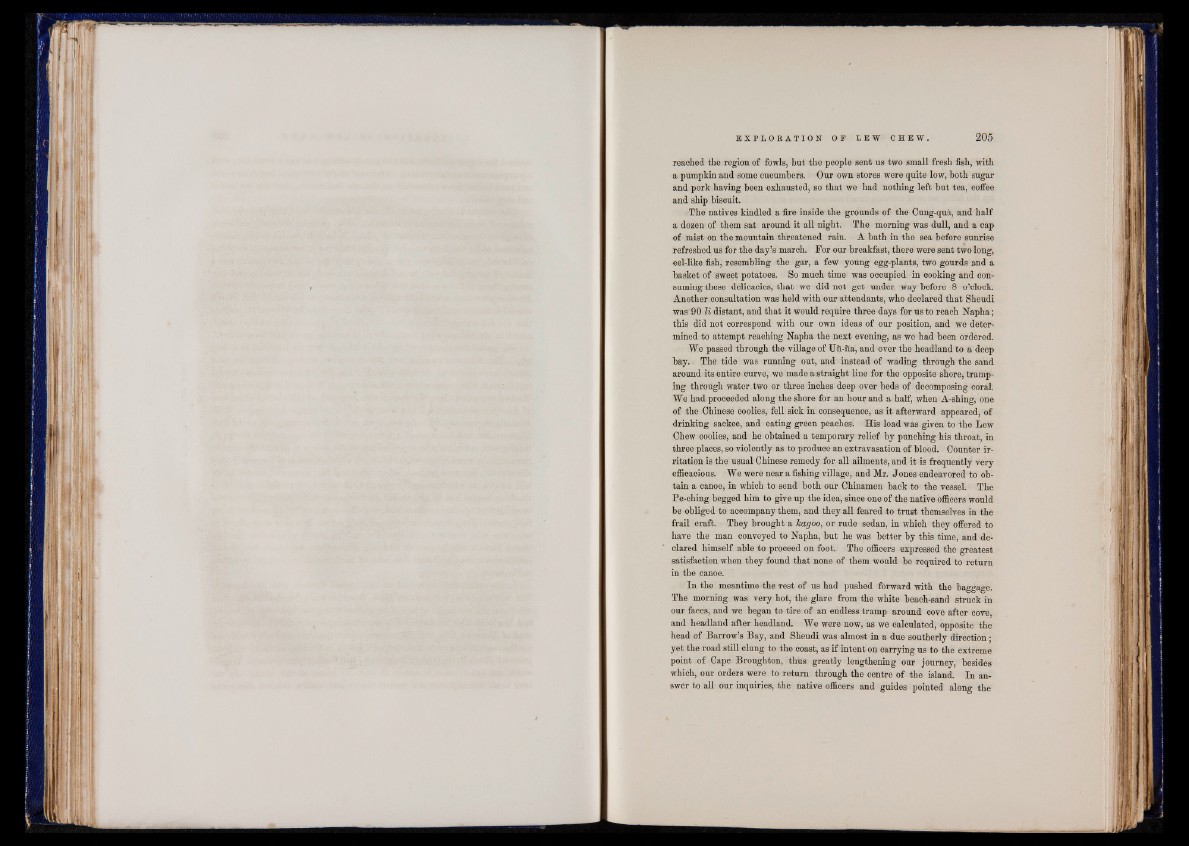
reached the region of fowls, hut the people sent us two small fresh fish, with
a pumpkin and some eueumhers. Our own stores were quite low, both sugar
and pork having been exhausted, so that we had nothing left but tea, coffee
and ship biscuit.
The natives kindled a fire inside the grounds of the Cung-qni, and half
a dozen of them sat around it all night. The morning was dull, and a cap
of mist on the mountain threatened rain. A bath in the sea before sunrise
refreshed us for the day’s march. For our breakfast, there were sent two long,
eel-like fish, resembling the gar, a few young egg-plants, two gourds and a
basket of sweet potatoes. So much time was occupied in cooking and consuming
these delicacies, that we did not get under way before 8 o’clock.
Another consultation was held with our attendants, who declared that Sheudi
was 90 li distant, and that it would require three days for us to reach Napha;
this did not correspond with our own ideas of our position, and we determined
to attempt reaching Napha the next evening, as we had been ordered.
We passed through the village of Uu-na, and over the headland to a deep
bay. The tide was running out, and instead of wading through the sand
around its entire curve, we made a straight line for the opposite shore, tramping
through water two or three inches deep over beds of decomposing coral.
We had proceeded along the shore for an hour and a half, when A-shing, one
of the Chinese coolies, fell sick in consequence, as it afterward appeared, of
drinking sackee, and eating green peaches. His load was given to the Lew
Chew coolies, and he obtained a temporary relief by punching his throat, in
three places, so violently as to produce an extravasation of blood. Counter irritation
is the usual Chinese remedy for all ailments, and it is frequently very
efficacio us. We were near a fishing village, and Mr. Jones endeavored to obtain
a canoe, in which to send both our Chinamen back to the vessel. The
Pe-ching begged him to give up the idea, since one of the native officers would
be obliged to accompany them, and they all feared to trust themselves in the
frail craft. They brought a Jcagoo, or rude sedan, in which they offered to
have the man conveyed to Napha, but he was better by this time, and declared
himself able to proceed on foot. The officers expressed the greatest
satisfaction when they found that none of them would be required to return
in the canoe.
In the meantime the Test of us had pushed forward with the baggage.
The morning was very hot, the glare from the white beaeh-sand struck in
our faces, and we began to tire of an endless tramp around cove after cove,
and headland after headland. We were now, as we calculated, opposite the
head of Barrow’s Bay, and Sheudi was almost in a due southerly direction;
yet the road still clung to the coast, as if intent on carrying us to the extreme
point of Cape Broughton, thus greatly lengthening our journey, besides
which, our orders were to return through the centre of the island. In answer
to all our inquiries, the native officers and guides pointed along the